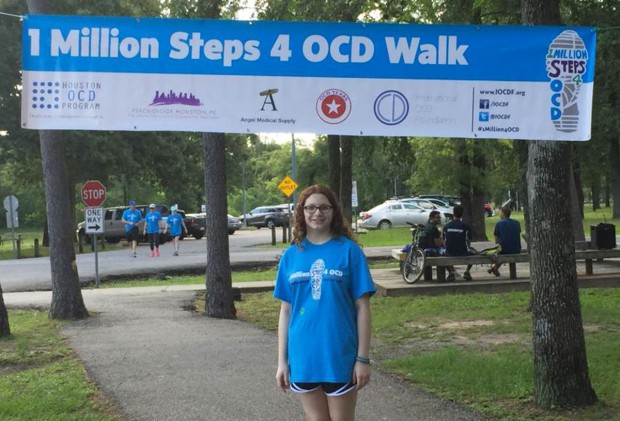Living with OCD: One Student’s Story

“I’m so OCD.”
To many, this phrase may be intended as a joke when referring to an organized or clean person. But for Emery/Weiner School junior Hannah Lovitt, OCD is a real, daily challenge. To Hannah and the more than 3 million kids and adults combined who deal with OCD every day, it’s not a joke.
Ever since she was 10 years old, Hannah and her family knew that there was something off. At age 4, Hannah was diagnosed with generalized anxiety disorder, but later in elementary school, her symptoms escalated. Hannah became afraid to touch things or walk barefoot around her house because it would trigger her anxiety. Such anxiety became extremely apparent during a trip to New York City when Hannah was 12. She refused to touch the subway or anything in her hotel room because she was afraid she would get sick. She notes, “Being in a new environment made me anxious, which brought out more OCD tendencies, which helped my mom recognize them.”
It was after that encounter that Hannah’s parents, Renee and Steven, decided to seek further help. Hannah’s parents reached out to her therapist to find out if OCD was behind this triggered anxiety and tendencies. According to the International OCD Foundation, OCD, otherwise known as Obsessive Compulsive Disorder, is a mental health disorder that can affect anyone who is stuck in a pattern of obsessions and compulsions. A diagnosis of OCD is made when the obsessions and compulsions become so “extreme that it consumes a lot of time and gets in the way of important activities that the person values.”
Immediately after Hannah’s diagnosis, she started with a form of Cognitive Behavioral Therapy known as Exposure Response Prevention Therapy, in which an individual approaches situations or objects that trigger anxiety and then actively expose themselves to it. For example, Hannah couldn’t walk barefoot in the kitchen because her OCD told her that the floor was contaminated. So she would practice taking off her shoes and socks and walking on the floor, even though it was hard for her. This practice, or exposure as it is called, is now something that Hannah doesn’t even think about anymore. “Now it's not a trigger for me at all. I really don't even think about it when I enter the kitchen barefoot,” she says.
At first, Hannah was scared to do this kind of therapy because it caused her a lot of anxiety to expose herself to things that triggered her OCD. She felt that she was exposing herself to germs and bacteria that would make her sick. Additionally, she says, “I saw myself as weird and different.”
At 13, Hannah attended the Annual OCD Conference in Los Angeles, where she met other kids, teenagers and adults with OCD who had gone through therapy and gained control over their OCD. They were able to overcome their obsessions and compulsions, which showed Hannah that she too could do the same thing and have a similar success story.
Although it has been a very tough process full of highs and lows, through such exposure and therapy, Hannah says that she is now able to do many things that before therapy that she was never able to do. For example, Hannah couldn’t touch the outside of a car, share food, or touch other people and things they had touched, but thanks to her therapy, Hannah can do all of these things without anxiety.
In middle school, Hannah lost many friends because they thought she was weird due to her obsessions and compulsions. “I was lonely,” she says. While she doesn’t blame her peers for not understanding what she was going through, it was still hard for her. It wasn’t until her ninth-grade school trip to Big Bend National Park when Hannah decided to open up about her OCD to her entire grade. “Everyone was extremely supportive, and that made me realize that there are going to be people that may see you negatively, but most people will be supportive of anything you go through,” she said.
Because of her journey, Hannah has known for some time that she wanted to be a mental health advocate, but “I didn’t want to wait until I grew up to become one.” When Hannah was approached about serving as Grand Marshall for OCD Texas’ 1 Million Steps 4 OCD Walk, she immediately jumped at the opportunity.
She said, “I’m really excited to do this to show people that I’m an ordinary teenager. Yes, I have OCD, but I’m no different than you are.”
Hannah hopes that through her role as the Grand Marshal for the OCD Walk, she can further her goal of becoming a public speaker for mental health advocacy. She adds that this walk is a great opportunity because she will give a speech before the walk begins. “Having this opportunity has shown me that even though I’m still young - I’m only 17 - I can still make a difference and I can influence the mental health community and the people surrounding it,” she said. “I don’t have to be someone well known or famous to make a difference. I think other people can take away from that too; you don’t have to be famous in order to make a difference.”
Hannah says that her message to other people struggling with OCD or those that know nothing about mental health disorders is one of strength and resilience. She said, “I’m not going to lie and say that {exposure} therapy is easy, because it’s not, but it is one of the best things I’ve ever done. It’s given me the ability to do so many things that other teenagers do.” She encourages those struggling to “find people that support you and let them support you.”
Looking ahead, Hannah plans to continue her journey of mental health advocacy well into college and beyond. She plans to study communications in college so she can continue to be an advocate for OCD and other mental health issues.
OCD Texas’ 3rd Annual 1 Million Steps 4 OCD Walk is on Saturday, June 2, 2018 at Strude Park near the Heights. Co-hosted by the International OCD Foundation, the walk in Houston will be joined by 25 affiliate-hosted walks that are taking place across the country.
Hannah has also started a fundraiser for OCD awareness and research funds.
OCD Resources, Signs and Symptoms
The National Institute of Mental Health notes that people with OCD may experience symptoms of obsessions, compulsions or both.
The NIMH explains that obsessions are repeated thoughts, urges or mental images that cause anxiety. Compulsions are repetitive behaviors that a person with OCD has the urge to do in response to obsessive thoughts.
Signs and Symptoms of obsessions include:
- Fear of germs or contamination
- Aggressive thoughts towards others or self
- Having things symmetrical or in a perfect order
- Unwanted forbidden or taboo thoughts regarding sex, religion and harm
Signs and Symptoms of compulsions include:
- Excessive cleaning and/or hand washing
- Ordering and arranging things in a particular, precise way
- Compulsive counting
- Repeatedly checking on things
Those interested in learning more about OCD can visit the International OCD Foundation website where there are many resources available including brochures and fact sheets about OCD.
OCD Texas, an official affiliate of the International OCD Foundation also has resources available including information about finding a therapist along with access to a resource directory.
Want more buzz like this? Sign up for our Morning Buzz emails.
To leave a comment, please log in or create an account with The Buzz Magazines, Disqus, Facebook, or Twitter. Or you may post as a guest.



